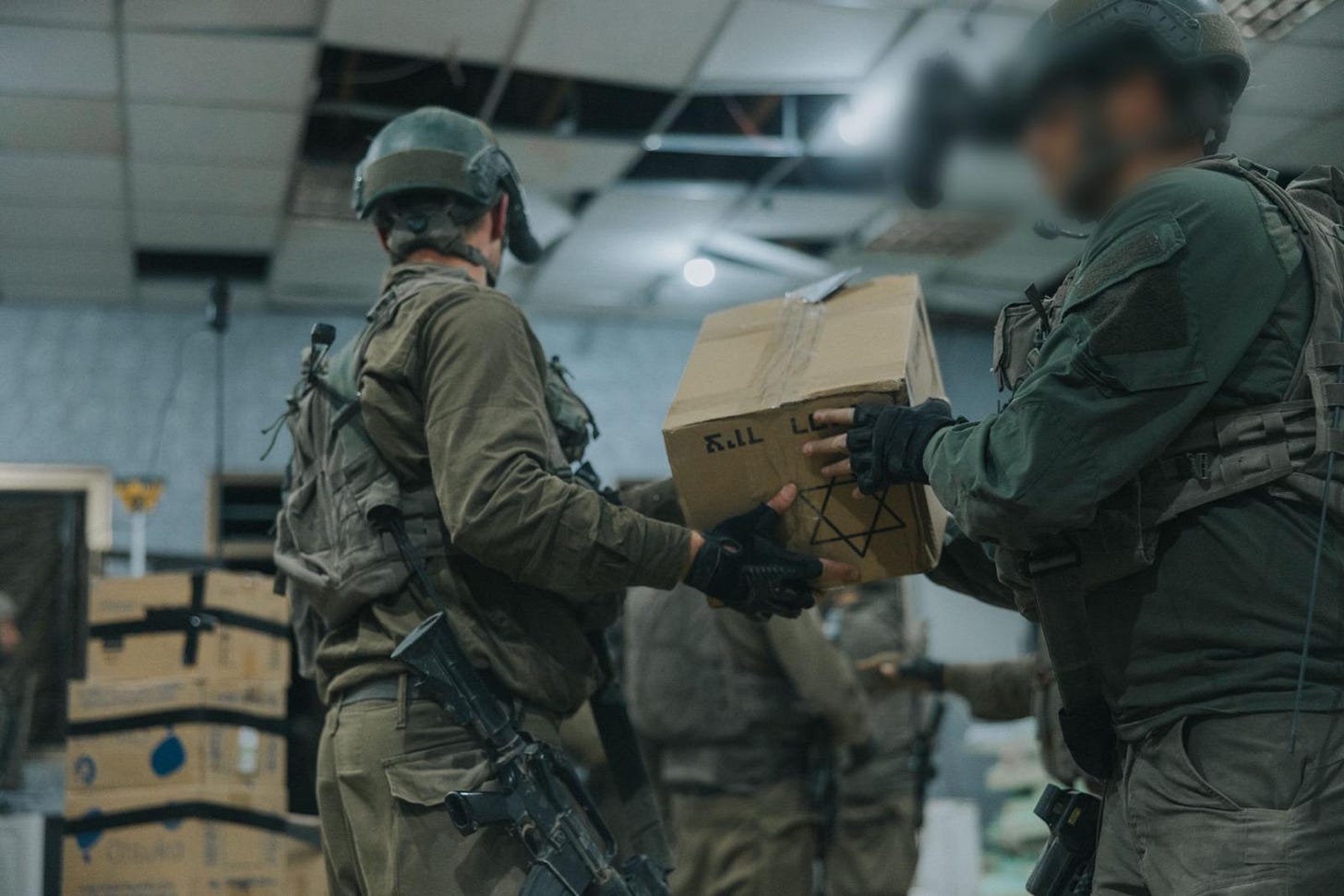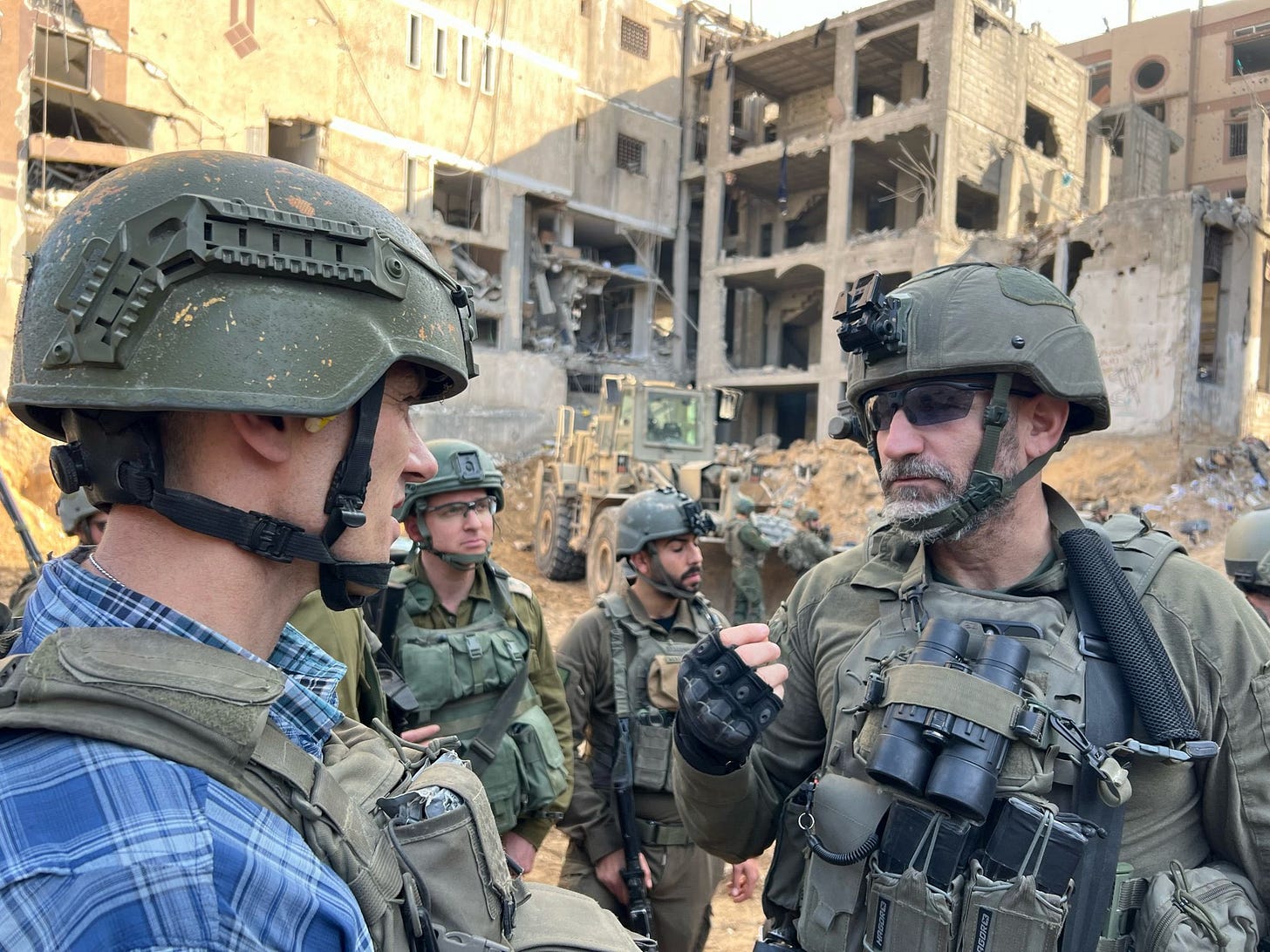Why the Israeli Army Is So Unbelievably Humanitarian
“Israel has taken more measures to avoid needless civilian harm than virtually any other nation that’s fought an urban war.”

Please consider supporting our mission to help everyone better understand and become smarter about the Jewish world. A gift of any amount helps keep our platform free of advertising and accessible to all.
John Spencer enlisted in the United States Army as a private, immediately after graduating from high school at age 17.
During his more than 25-year military career, Spencer was infantry platoon leader and company commander, including two combat tours during the Iraq War.
Now retired from active service with the rank of major, Spencer currently serves as the chair of urban warfare studies at the Modern War Institute at West Point, the U.S. Military Academy.
Two things are true about John Spencer: He is an expert at urban warfare, and he has no real skin in the game in this Israel-Hamas war.
After Spencer recently visited the frontlines in Gaza, he concluded:
“Israel has taken more measures to avoid needless civilian harm than virtually any other nation that’s fought an urban war.”1
“There is zero evidence of Israel indiscriminate bombing or targeting civilians in Gaza. Not one strike. Indiscriminate means not targeted and not against a military target. People that should know better have conducted effects based criticism despite the context and actions of the enemy (Hamas) that built all their military infrastructure under civilian sites and uses human shields (actually human sacrifice where they try to get as many of their civilians killed as possible).”2
“Israel provided days and then weeks of warnings, as well as time for civilians to evacuate multiple cities in northern Gaza before starting the main air-ground attack of urban areas. The Israel Defense Forces employed their practice of calling and texting ahead of an air strike as well as roof-knocking, where they drop small munitions on the roof of a building notifying everyone to evacuate the building before a strike. No military has ever implemented any of these practices in war before.”3
There is also plenty of anecdotal evidence to suggest that Israel’s military is hyper-humanitarian. Last week, as the IDF launched an operation against Hamas and Palestinian Islamic Jihad operatives who set up shop in the Shifa Hospital, Israeli soldiers established a dedicated treatment area for the patients’ safety — including infrastructure allowing advanced medical treatment and monitoring of patients by medical teams.
Israeli soldiers have put themselves in between Palestinian civilians using designated humanitarian corridors to evacuate, and Hamas terrorists trying to fire on these civilians to stop them from evacuating (so they can have more human shields and human sacrifice).
But why is the IDF so extraordinarily humanitarian? Where does this ethos originate?
After living in Israel since 2013, I can confidently say that the IDF’s humanitarian DNA boils down to five main reasons, in no particular order:
1) Ethical and Moral Values
Israel, as a democratic state, places significant emphasis on humanitarian values and human rights. This ethos extends to its military, where soldiers are systematically trained to uphold these principles.
Plus, the IDF is an army of the people. Whereas some armies are largely comprised of citizens who did not “make it” or were not “good enough” to pursue other opportunities, Israeli soldiers are every Israeli from every segment of society and walk of life: the good, the bad, and the ugly.
My experience with Israeli society is that 75 percent of Israelis are “good,” 20 percent are “bad,” and five percent are “ugly.” Just look at the Israel Prison Service: There is a reason that it has room for only 14,500 prisoners in a country with roughly nine million people.4
2) The Proximity of the Enemy
Whereas some countries send their soldiers to serve all over the world, far away from the motherland, Israeli soldiers by and large operate within Israel or in the neighboring West Bank.
This means that soldiers are a regular, active part of everyday society, not sectioned off or isolated from their family and friends during service. Even the most entrenched soldiers usually see their families and friends one or two times each month.
And they carry their military experiences with them into non-military life, so there is also social pressure to maintain an ethical and moral conscience.
3) Jewish Values
For many Israelis, Jewish values are deeply ingrained in their national, cultural, and religious identity. Since the Jews were among the world’s first modern-era humanitarians going back to the days of Abraham and Sarah, the State of Israel has embodied humanitarianism in modern times.
For instance, enemies are often given free, urgent medical treatment in Israel, and Israeli prisons are considered some of the “most comfortable” on the planet.
4) The Size of the Country
Israel is a tiny country. Think three degrees of separation.
Thus, how you behave and what you do during your army service is most likely to follow you afterward as you seek educational, social, and professional opportunities.
And during their army service, soldiers know that any misconduct could easily make the news and be heard by all of Israel within just a few hours.
5) Strategic Considerations
Israel is surrounded by regions of conflict and instability, so engaging in humanitarian efforts can help build positive relationships with neighboring countries and communities, fostering stability in the region.
Plus, Israel has developed significant expertise in areas such as disaster response, medical assistance, and refugee aid — due to its geopolitical situation and history. The IDF often utilizes these skills in international humanitarian missions.
For example, after a devastating earthquake struck Turkey and Syria on February 6th, 2023, Israeli aid organizations became one of the first foreign aid responders on the ground. As is sometimes the case in the Middle East, crises become a moment for countries to demonstrate a different side and even perhaps a show of unity.
Israel also understands the importance of its international image. Engaging in humanitarian missions enhances its reputation on the global stage and helps counter negative (false) narratives that engulf the Israeli-Palestinian conflict.
All of these reasons aren’t to say that the IDF does not make mistakes and that some of its soldiers are nefarious actors. Every army makes mistakes and has nefarious actors, as a matter of fact. In this regard, the IDF is rather ordinary.
But so many people persistently act like every single death in Gaza is implicitly or explicitly Israel’s fault. And the mainstream media keeps telling us about the number of innocent Palestinian deaths, which is fine, but why don’t they also mention the scores of Palestinians who have survived because Israel has taken unbelievable precautions to protect them?
As John Spencer said: “Israel has taken more measures to avoid needless civilian harm than virtually any other nation that’s fought an urban war.”
It is time for the world to acknowledge this — no if’s, and’s, or but’s.
“Israel Implemented More Measures to Prevent Civilian Casualties Than Any Other Nation in History | Opinion.” Newsweek.
John Spencer on X
“Israel Implemented More Measures to Prevent Civilian Casualties Than Any Other Nation in History | Opinion.” Newsweek.
“Report: At least 100 Gaza terror suspects yet to be processed due to overflowing prisons.” The Times of Israel.



Excellent. Now show the world with videos and interviews with the people of Gaza. Even though the majority of haters won’t be convinced, some might see the light.
Spot on!